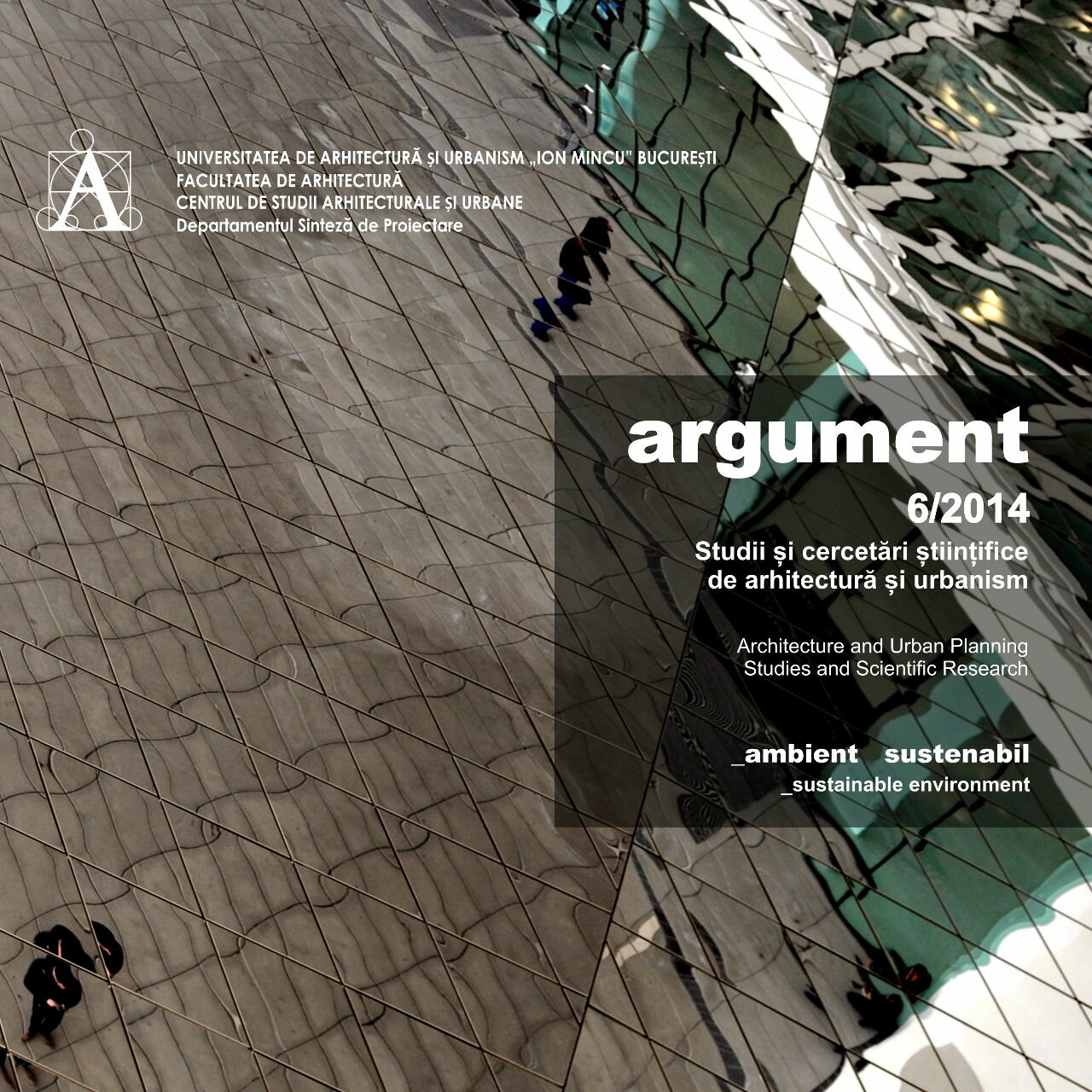
Argument 6/2014
Sustainable Environment
- Coordinator:
- Prof.dr.arch. Daniela Rădulescu - Andronic
- Cover:
- dr.arch. Ana Maria Crișan
- Graphics:
- Roland Vasiliu
- DTP, editing:
- arch. Maria Mănescu
© 2014 Editura Universitară „Ion Mincu” Bucureşti
Foreword
Georgică MITRACHE
The current issue of the ARGUMENT publication brings up for discussion a subject whose particular relevance is marked in the field of architectural practice by new interventions and edification activities under the influence of sustainability. Even though the field’s terminology is currently being debated, the amplitude of interventions in urban context on the one hand, and of those aiming to revitalize interest in rural areas on the other, doubles a growing interest towards the subject. One can discuss about sustainability in regard to all the connected fields of design, but what the authors of the studies included in this volume aim to achieve is to explore and exploit a specific area, defined by what sustainability signifies at the level of ambient.
The debates on the theme of ambient focus on the means by which architecture could become a propellant of the responsible practices at a global level. To what extent an active design process can organically integrate ecological aspirations and in which way can they generate an architectural practice that takes into account the responsibility that comes with each completed building? These are two questions to which the participants of this session of communications tried to answer by presenting, debating and confronting the practical experiences with the aspirations of the profession.
The texts are grouped into seven different sections, as follows:
1. Community / Sustainable society brings up for discussion the social factor as a working instrument in the substantiation of new sustainable interventions. Through a reflexive process, the social frame adapts the new elements and makes it easier for them to be implemented. Communicative design, sustainable communities and participative architecture are just a few of the key-words of this category.
2. Concepts / Connections / Ideas reflects interactions between the field of sustainable design and other fields in connection to it, bringing forward the importance of experiment, of documentation and research ranging from the specific to the abstract.
3. Expression of Sustainable Architecture delineates the active preoccupation to maintain an aesthetic quality of architecture by applying, at the same time, innovative concepts and technological novelties. The participants debated the statute of sustainable architecture, doubled by experiments in the field of expression, landscape dynamics and social feedback.
4. Sustainable Forms of Urban Transformation is orientated towards the most effervescent area of architectural practice - the urban context - presenting examples of means by which urban transformation can be implemented, using new principles of sustainability.
5. Reconfiguration - Conversion brings up for discussion an activity which has earned an important place in recent architectural practices, and whose amplitude promotes it as an instrument for heritage reclaim.
6. Competitions – Programmes / Research Studies is the section which discusses some of the most recent successes in architecture related events and competitions.
7. Students’ Opinions brings a fresh contribution in a field which is becoming more appreciated inside the university structure as well.
All texts included in this volume invite to a reflection upon the need to inventory and manage the current architectural practices, overlapping them with an increasingly obvious tendency to preserve the resources and the natural context. Even though some research cast a critical shadow upon the edification and exploitation activity, there are more than a few examples which come to confirm a change of paradigm in everything that concerns the architectural practice in Romania.
1. Community / Sustainable society
Mihaela Zamfir (Grigorescu), Mihai Viorel Zamfir
Sustainable communities in the context of the ageing society. Premises for architecture
Lorin Niculae
The communicative planning, key factor for the sustainability of social architecture
Sebastiaan Veldhuisen
Sustainable environment
Alexandru Ioan Nichifor
Intentional sustainable communities – places generating architectural innovation
Radu Sfinteș
Football arenas - Educative function in contemporary society
2. Concepts / Connections / Ideas
Adrian Vidrașcu
Prolegomena to the tectonics of architectural (co)homotopy groups
Liana Iliu
From the physical to the theological place – about optimum conformation of Christian worship space
3. The Expressiveness of Sustainable Architecture
Ștefan Mihăilescu
Star architecture versus sustainable architecture
Ștefan Mihăilescu, Marina Mihăilă, Mihaela Zamfir (Grigorescu)
3 case studies – a discussion on sustainable environment.
Tana Lascu
Sustainable aspects in the dynamic of the Dutch rural landscape
Dana Chirvai, Alina Voiculeț, Marius Solon
Sustainable ambient between technology and expresivity
Anda-Ioana Sfinteș
Museal space serving the community
George Miron Stăncioiu
Traveller’s building - Alternatives and personal points of view
4. Sustainable Forms of Urban Transformation
Ognen Marina, Bojan Karanakov
Urban mediation as a tool for sustainable urban transformation
Melania Dulămea
From composition to strategy - sustainable visions for the residential project
Maria Boștenaru Dan
Resort Architecture In Balatonfüred, Hungary – Urban Route
Alexandra Păcescu
Historic urban heritage as sustainable environment
Iulia Maria Delcea
Local sustainability and re-territorialisation – the spa town project revisited
Ovidiu-Horațiu Teleche
A study on the Post-War collective housing in Romania: density, privacy, personalisation
5. Reconfiguration – Reconversion
Anca Mihaela Constantin
Sustainable rehabilitation of public urban space
Anca Stăncioiu
Rehabilitation and conversion of industrial buildings
Anca Stăncioiu
Rehabilitation of old social residences developments
6. Competitions – Programmes / Research Studies
Dorina Onescu-Tărbujaru, Lucia Leca
PRISPA post Madrid
Grigore Negoescu
”Low Carbon” architectural competition
Maria Boștenaru Dan, Diana Mendes
Economics of the earthquake risk mitigation in the urban and constructive structure
7. Students’ Opinion
Iulian Popa, Patricia Manea
“Unknown” competition
Alexandru Mihai Nițu
Special issues for determination of urban space through sustainability approach based on the concept